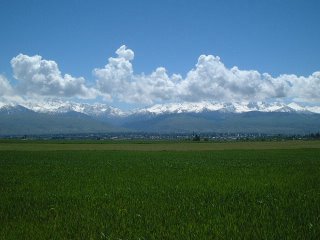
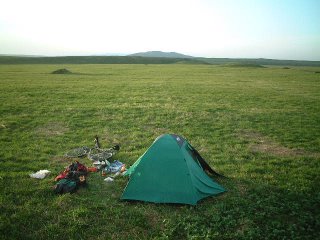
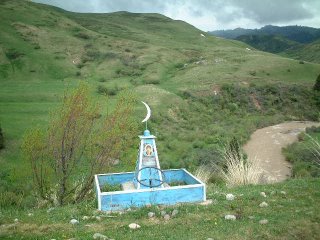
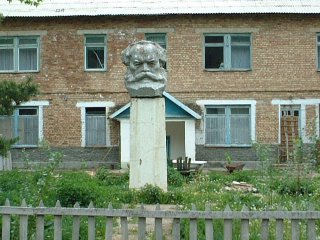
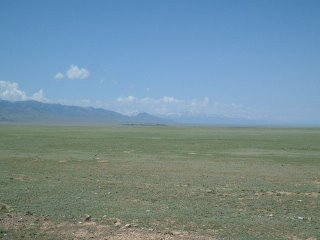
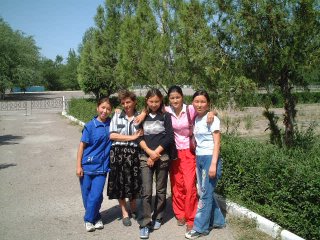
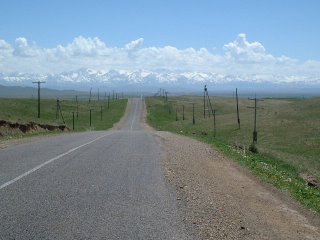
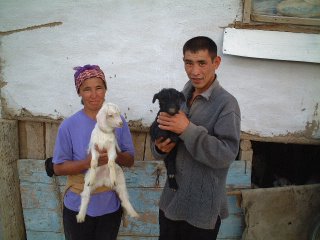

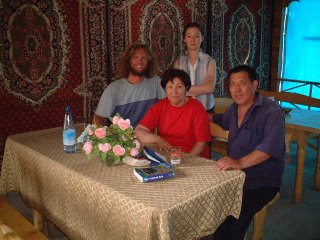
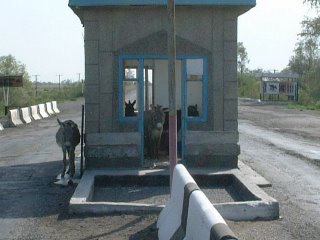
Hello Everyone:
I'm two countries along from where I last wrote; I've nipped across a tiny bit of Kazakhstan and bumped downhill to the little tourist town of Karakol (formerly Przhevalsk, if you've got an older map), on the shores of Lake Issyk Kul in Kyrgyzstan. Since it was a tough slog getting here, and since the weather forecast is for lots of rain, and since it's a pleasant enough little town, I've decided to take a couple of rest days here and catch up on sleep, correspondence and my Russian study.
I last wrote late at night from the Chinese-Kazakh border town of Khorgos, 4824 kilometres by road from Beijing and 4238 kilometres from my original starting point in Xian in 2002. The next day I ran around trying to buy things I needed, like a bigger monkey wrench and a new lock, before heading to the border. I wasted a lot of time looking for somewhere to change money in town; I finally gave up and when I pulled up to the customs shed, a posse of moneychangers descended on me waving sheaves of Kazakh tenge and offering poor rates. After a bit of haggling, I accepted my stack of new money and headed through customs. I had anticipated the Kazakh customs officials being officious and sticky-fingered, but they barely glanced at me or my luggage; the Chinese were much more thorough, having me pass all my luggage through X-ray machines. I had to load my bike into a van for the short ride across no-man's land, still marked by barbed wire and landmines; in the 1950s and 1960s, this border area saw occasional artillery duels, and it's still heavily guarded. After lots of waiting in line, suddenly I was at liberty in Kazakhstan.
As I rode towards the first town in Kazakhstan, still being blown by the tailwinds of the previous day, I looked around to see what was different on this side of the border. For one thing, the countryside seemed much less densely populated; whereas on the Chinese side most of the land was irrigated agricultural fields, on the Kazakh side it was rangeland for flocks of sheep and herds of cows. The pencil-thin Lombardy poplars that had lined much of the road through China gave way to shorter, squatter trees, and the vehicles were suddenly all old Russian Ladas or newer European Audis. The trucks were mostly old European transports with their German or Dutch company markings still on them.
Zharkent, where I spent the night, was a very European-feeling town after China. Every house had a picket fence around it enclosing a little garden, and the regular city blocks, shaded by tall trees, felt a little like Thunder Bay. I tried to register with the local police, but after 45 minutes of being bumped around and ignored by various Kafkaesque bureaucrats, I was told that I didn't have to register anymore. This is apparently not true, but I think the bureaucrat in question just couldn't be bothered. I found a cheap hotel and set off to find a decent roadmap of Kazakhstan. Even though I was helped in my quest by a young ice cream vendor, it was a fruitless search; apparently no-one in Zharkent really needs maps. I had fun anyway, though, practicing the Russian that I studied so many years ago. I found that it was much easier talking to Kazakhs than it had been talking to Chinese people, and it was nice to feel a bit more part of a society rather than a freakish outcast.
The next day I set off with the dawn through a pretty forest and then struck off south across the open steppe. Much of the land was marshy, and was alive with birds of various sorts; I wished that I had a bird book with me. After 60 kilometres, I stopped in a small town and realized how different Kazakhstan was from China. Whereas in China the tiniest hamlet will have several food stores and a few restaurants, here it took me forever to find the one shop in town. I asked for bread. "Nyet." Cheese? "Nyet" Apples? "Nyet." What did they have? Chocolate bars, hideous cookies and lots and lots of vodka. The ladies who ran the shop were friendly enough and so were the schoolgirls who came in to buy candy and stayed to chat with the foreigner, but it didn't do much to assuage my hunger.
Further down the road, in the larger town of Shonzhy, Malik, a cafe owner, beckoned me in off the street. He plied me with tea and the best noodles I've had since China, and fetched his daughter Rina who wanted to practice her English. It was much more fun chatting with the family than sweating my way through 35 degree heat, so I sat and talked to them about Canada and how Rina could get to study English there. Malik described a perfect camping place for that evening, and refused all talk of payment when it came time for me to settle the bill. I rode out of town in the late afternoon and was rudely surprised to find that the road was no longer across a level plain, but instead climbed relentlessly towards the mountains across a near-desert. Just as I was despairing of finding a place to spend the night, the road disappeared into a deep canyon and I found the perfect campsite that Malik had described. On my way to a grassy riverside meadow a family of shepherds invited me in for tea, bread, cheese and sour cream. It was fun sitting there trying to express myself in Russian. Only one of the family really spoke good Russian, so he played Kazakh-Russian interpreter. Finally I tore myself away, set up my tent and fell asleep to the sound of rushing water and croaking frogs.
In the morning, I found that I had an even steeper climb ahead of me. For 21 kilometres I toiled uphill at 6 km/h, wondering, as the altimeter ticked towards 2000 metres, how high the border crossing into Kyrgyzstan was going to be. Without a decent map, it was hard to tell what lay ahead of me. I was pleasantly surprised, then, to reach the crest of the pass some 40 kilometres from the border and find an emerald-green plateau flecked with horses and sheep in front of me. I zipped into the town of Kegen, stocked up on groceries and rode off towards the Kyrgyz border. As the road neared the border, it deteriorated into something resembling a back alley, and I wondered if I had missed a turn somewhere. Instead I came around a corner and found, in front of me, a pair of shacks that marked the international border. Half a dozen Kazakh soldiers in the throes of terminal boredom clustered around to check out my bike and ask questions about my trip. On the other side, a single Kyrgyz soldier checked me in in about ten seconds, and there I was, entering my 60th country.
The Karkara valley, across which the border was drawn arbitrarily, is one of the historic crossing points of the Tien Shan. It's only 2100 metres in elevation at its highest point, and countless armies and migrating tribes have used it as a highway between the steppe to the north and Lake Issyk Kul to the south. The Scythians, mentioned by Herodotus in 500 BC and who recur in history for 10 centuries after that, left their mark in the form of a series of burial mounds that jut up from the flat valley floor. I camped beside one of them and watched the last rays of the sun lighting up the rest of these royal tombs.
Yesterday morning I set off under menacing skies with Karakol as my destination. The valley floor was so flat and marshy that it was hard to tell exactly where the top of the pass was; I had to keep checking the direction of flow of water to see whether I was going uphill or down. Muskrats frolicked in the stream while eagles and black cranes circled lazily overhead. The ratio of horses to Kyrgyz seemed to be about 100 to 1, and I barely saw a single human, no matter how young, who wasn't mounted on horseback. I recalled that some theories of the origin of the Kyrgyz people had them as descendants of Genghis Khan's hordes, and they looked the part, with their high cheekbones giving them a Mongol or Tibetan appearance. Another great conqueror and fan of raping and pillaging, Tamerlane, is said to have passed this way and left a pile of rocks as a memorial to his battle dead, although it looks rather more like a pile of rocks stripped from the lining of a nearby burial chamber.
At this point the menace of the skies was borne out in the form of rainshowers and I put raincovers on my panniers and a raincape and rainpants on myself and settled in for a long, wet ride. It rained intermittently most of the way down the long, flat, agricultural valley, filled with farmers out planting potatoes, and then the heavens opened in a torrential downpour that lasted for the next 45 kilometres. There were more horse-drawn carts on the road than cars, and the men all sported the white felt Kyrgyz national hats, but there was no chance to snap any photos. I was invited to shelter at a gas station, where the obligatory tea and bread helped warm me up, but eventually I had to face the inevitable and head back out into the storm. By the time I reached here I was tired and cold and the final uphill into town was a cruel blow. I found the local backpacker hangout, Camp Turkestan, and settled in for a sound night's sleep in my own personal yurt.
I'm really enjoying the Central Asian republics so far; I find the people friendlier and easier to talk to than in China. It's partly that my Russian is better than my Chinese, but also, I think, a more European mindset that makes for easier communication. Food is a bit less satisfying and more expensive here, but so far the friendliness of the people makes up for that. The ethnic diversity here is striking; Kazakhstan featured lots of Uyghurs (the Turkic people who are the largest ethnic group in Xinjiang province), plenty of Russians and Kazakhs and a few Kyrgyz, all within a tiny corner of the country. I feel a bit bad that I speak to everyone in Russian, the language of the imperial oppressor, but it beats trying to speak a different language in each country. Although Kazakh, Kyrgyz and Uyghur (as well as Uzbek) look pretty similar to me when I compare them in my Lonely Planet phrasebook section (they're all Turkic languages), the locals I talk to say that they're not really similar enough to understand well, so that when Kazakhs speak to Kyrgyz, they usually use Russian.
So now I'm contemplating what to do next. I had hoped to go hiking for a few days into the mountains to see Pik Pobeda (Victory Peak) and Khan Tengri (Lord of the Heavens), the two highest peaks in the Tien Shan, and I shelled out money for a border zone permit to do just that. Looking at the weather forecast, though, it looks like rain from now until June, so I'm not sure I want to go walking in the rain in return for views of clouds. I'll make up my mind tomorrow what to do. I have to head eventually to Bishkek to pick up visas for Uzbekistan and Tajikistan, my next two countries, and then I'll bike south towards Osh and the Tajik border.
Hope that everyone is well and enjoying themselves; I certainly am!
Cheers
Graydon
